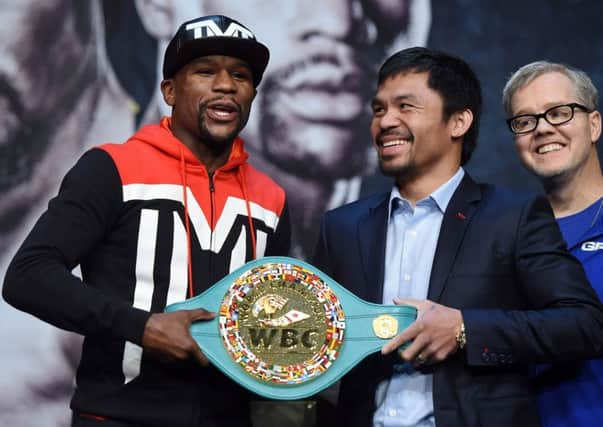Alex Massie: Mayweather-Pacquiao a fan sucker punch


Tonight, in Las Vegas, Floyd Mayweather will fight Manny Pacquiao in the richest fight in boxing history. It should be a great occasion matching two of the planet’s finest pugilists in a bout that will help define their respective legacies.
This “fight of the century” is supposed to revitalise big-time boxing. Instead it shows how far boxing has fallen. Mayweather-Pacquiao is unusual because it’s supposed to matter. That makes it unusual. It is also a fight that, albeit obliquely, has lessons for business and even politics too.
Advertisement
Hide AdAdvertisement
Hide AdCuriously, the $300 million (£198m) fight purse makes the bout less, not more, relevant. By any estimation this is an extreme amount of money and a purse so extravagant it risks making subscribers to pay-per-view seem like chumps. It’s not about the glory, it’s all about the greenbacks. Commercial success is not the same as sporting success.
It is a reminder that you can have too much of a good thing. What the market will bear is not the same, as investment bankers have discovered, as what is seemly. And when the rewards for enterprise so outweigh the actual enterprise involved the entire game is easily corrupted. The sweet science has rarely treated its devotees well, but these days it scarcely even pretends.
In a curious sense, boxing was more honest when it was more corrupt. The fight game has always had its shabby side and while no-one would wish to return to the days when matches, and even championships, were heavily-influenced by organised criminal syndicates, there is a plastic quality to much high-level boxing that renders it utterly inauthentic.
And, as politicians know, authenticity matters. Pacquiao, who is 36, is a national hero in his native Philippines, perhaps the greatest his country has known in the modern era, but for the rest of us he is, in the end, just another guy, albeit a formidably powerful and gifted puncher. Mayweather, 38, for his part, might be the most gifted defensive boxer in decades but neither his style, nor his personal character, are entirely attractive to the average fan. He is not the kind of fighter to inspire hymns of praise, far less dreams of glory.
So much of the hype attached to big fights these days is so plainly manufactured and so clearly designed just to extract yet more cash from easily-gulled punters that, in the end, it devalues the contest it purports to promote. It isn’t real, and because it isn’t real it doesn’t matter. In this respect, boxing is far too close to election-time politics in which extravagant promises everyone knows cannot be met are sold because, for some reason, a tacit agreement exists requiring fake promises about fake policies for a fake future. Everyone knows this, hates it, and insists upon it.
But if you can fake authenticity then you can fake anything. And you’ve probably got it made, too.
There are, however, other lessons. Once upon a time there were only eight weight divisions even casual fight fans could name a good percentage of the fighters with claims to being world champion. Today there are 17 weight divisions and no fewer than four sanctioning bodies, each of whom has its own “world champion”. In other words, it is possible for as many as 68 fighters to pretend to be “world champion”. Boxing has ignored the laws of supply and demand and, in doing so, diminished and devalued the very product it tries to sell. If boxing doesn’t care who the real champ is, why should fans?
And because the “product” is less valuable than once it was it requires ever more ingenious marketing to sell it. That marketing, however, cannot disguise the essential problems with the product and that in turn adds to the sense the public is being defrauded. Which, in turn, diminishes interest in, and the value of, the product. The evident commercial success of the Mayweather-Pacquiao fight might seem to contradict this thesis. In fact it confirms it. Fight fans have been so starved of meaningful action in recent years that even this bloated, five-years-past-its-prime, match-up seems attractive.
Advertisement
Hide AdAdvertisement
Hide AdIf great fights – the kind that could really capture the popular imagination – were never so common as we remember them being they were still vastly more common, at least in this country and in the United States, than they are today. The golden age of Muhammad Ali, Sonny Liston, George Foreman and Joe Frazier was unusual but so too was the later, lighter-weighted, glory of Sugar Ray Leonard, Marvin Hagler, Tommy Hearns and Roberto Duran. Such heights have only rarely been glimpsed since during an age in which the top fighters have spent more time avoiding each other than fighting amongst themselves.
The unbeaten Mayweather, for his part, said this week that “Nobody’s gonna brainwash me that Sugar Ray Robinson and Muhammad Ali are better than me, no way.” But, he added: “I will pay respect to them because they paved the way for me to be where I’m at”. As the boxing writer Kevin Mitchell wryly observed: “It does not seem to occur to Mayweather… that, in paying respect to two acknowledged legends only in the context of what they have done to help his own status, it is really no respect at all”. But then Mayweather may not appreciate that heritage matters and that history provides the context for his own achievements. Trash that history and, in the end, you pervert your own legacy.
Undaunted Mayweather added, “Floyd Mayweather lives for Floyd Mayweather, whatever no-one says. Business mind: if you pay to see me lose or you pay to see me win, you’re paying’ and I’m collecting’.” Ain’t that the truth? And ain’t that as good an explanation as any for how boxing killed itself? In that respect and for all its shortcomings, boxing is still a kind of morality tale.